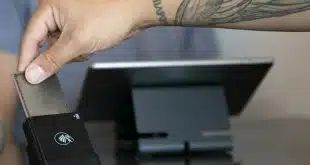Could a little-noted provision in the Durbin Amendment strangle the nascent U.S. contactless-payments market in its crib? It’s a very real possibility, says a pair of researchers, and the consequences could deal a blow to the prospects for mobile payments that depend on a promising technology called near-field communication (NFC).
“I see this as having a chilling effect on NFC,” says Andy Schmidt, research director for global payments at Needham, Mass.-based researcher TowerGroup. “It could short-circuit the value proposition behind millions of dollars of investment [in NFC].”
While the payments industry’s attention has been riveted on Durbin’s much-vaunted debit card interchange caps and transaction-routing restrictions, the law also tells networks they must allow merchants to set transaction minimums for credit cards, so long as the minimums don’t exceed $10. The law restricts merchants from discriminating among card issuers or networks in setting their minimums. Card networks for years have banned such minimums, fearing they discourage card usage. But some merchants, especially smaller ones, have set minimums just the same to protect their margins from interchange costs on small tickets.
The provision for minimum transactions, one of the few in the Durbin Amendment to address credit cards explicitly, would effectively narrow the window for contactless transactions from the current $0-to-$25 range to $10-to-$25. Network rules generally require signatures for transactions above $25, rendering the tap-and-pay throughput of contactless less useful. That means that if enough merchants take advantage of the provision, they could effectively shut out much of the contactless market. Indeed, Brian Riley, senior research director in the retail banking and cards practice at TowerGroup, notes the average contactless ticket is $8.42 (A recent Federal Reserve payments study found higher average tickets for contactless–$20 for signature debit and $43 for credit cards.) Durbin “has the ability to take the wind out of the sails” of contactless payments, Riley says.
Riley and Schmidt predict small merchants would be most likely to capitalize on the provision, though Riley sees convenience stores as likely to be attracted to it, citing their active lobbying for interchange controls. “That’s an area that’s pretty vulnerable,” he says. Schmidt concedes the law gives merchants the freedom to refuse credit card transactions under a set minimum, but doesn’t compel them to. Still, “as merchants get pushed [on interchange costs], there is the potential to see these types of refusals happen on a more frequent basis,” he says. “You have a fractured payments landscape, when we were pushing for a more cohesive one.”
Though a number of major banks have issued contactless cards, which use radio waves to transmit card data to readers at the point of sale, consumer adoption has proven to be “lackluster,” says Schmidt, weakening the case for merchants to install readers. The minimums permitted under Durbin only worsen that case, Schmidt and Riley contend, and hence worsen the case for NFC, which permits mobile POS payments but depends on the same readers. “It could stall [merchant] adoption,” says Schmidt. This comes just as banks and telecom companies are showing signs of gearing up NFC trials. Last month, a carrier-led consortium called Isis said it will commence a pilot in Salt Lake City, Utah, next year, with more cities planned.
While the Durbin Amendment, which is part of the Dodd-Frank Act signed into law last summer, hands rule-making authority to the Federal Reserve, the Fed apparently will not set rules concerning transaction minimums. In the proposed rules it released in December, the banking regulator called the Durbin language on the subject “self executing.” In response to Durbin, the Fed has proposed rules for debit card interchange caps and transaction routing. But it has conceded its final rules, originally expected this month, will be delayed. And bills pending in Congress would delay rulemaking by either one or two years to allow for further study.





